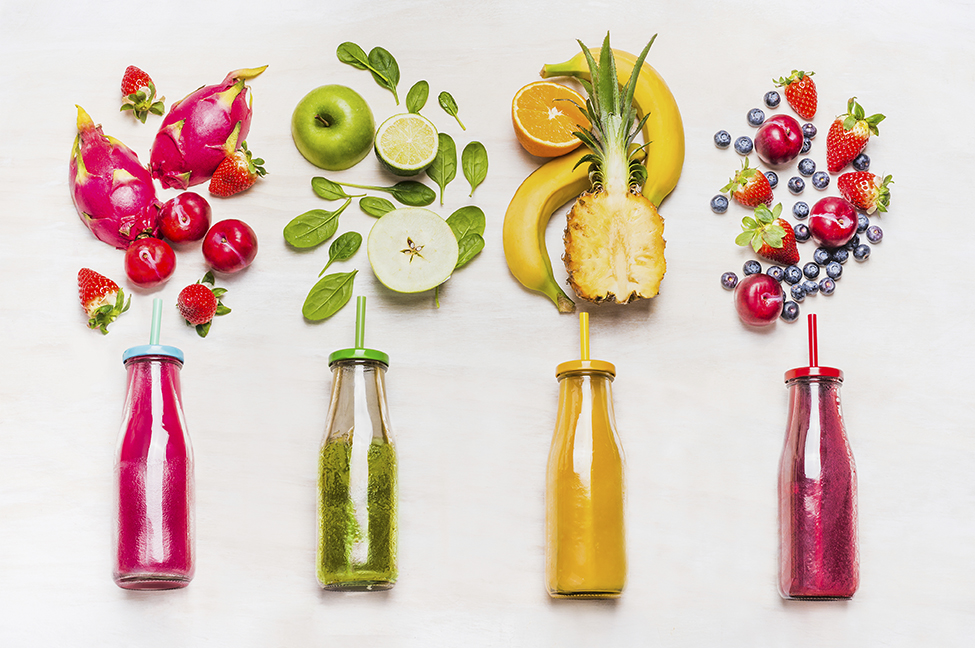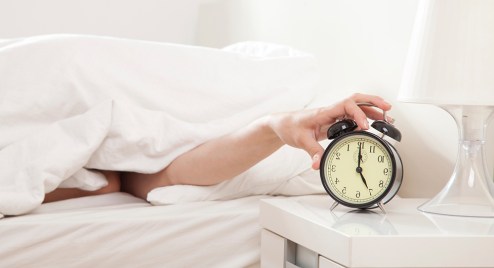The detox myth
Real-food radical and leading nutritional therapist, Eve Kalinik, gets to the bottom of one of the biggest misconceptions in modern health – that our bodies are all in desperate need of a detox, and that abstinence and cleansing are the answer

Have you ever had a detox massage? Bought a detox smoothie? Tried a ‘cleanse’ supplement, or maybe bought a programme in a box, that promised to leave you leaner, cleaner and far healthier than you were before? Sales of such things typically boom in the aftermath of the festive season (with all those inevitable indulgences). Alternatively, it might be the dreaded prospect of getting into that bikini in a month or so, or simply just an accumulation over many years that leads to one too many fab outfits being pushed hopelessly to the back of the wardrobe.
So what’s not to love about a detox? Something that not only promises to shift those pounds but to also give brighter skin, reduce troubling digestive symptoms and alleviate the body from the onslaught of daily toxins. Gaining mass popularity and being endorsed by various health aficionados and celebrities alike, the notion of flushing toxins out of your system within a matter of days seems like a very attractive solution – but can it really do what it says?
Firstly, it’s important to understand what the term ‘detox’ really means. In the true medical sense, it is used to refer to removing harmful and addictive substances, such as poisons, drugs and alcohol, from the body. But more recently it has found its own mainstream definition in the form of a restricted short-term diet that usually involves abstinence from certain foods and drinks, and that may also be accompanied by elaborate health and beauty regimes (from body brushes to ‘detox’ clay masks).
Detoxes can go from moderate to the more extreme – commonly, one eliminates sugar, caffeine, alcohol and the refined processed foods; increasingly common, however, is the exclusion of other larger food groups, such as dairy and gluten. There are also specific pills and potions dedicated to a cleansed gut, alongside the more extreme liquid fasting regimes. Juice cleanse, anyone?
To be fair, the idea of total abstinence isn’t a new one. In fact, history shows that our ancestors would embark on complete fasting to support the body’s regeneration processes, and there is certainly some research to back this up as a way to support the decrease of certain inflammatory markers, but only when used in a very targeted way. But this is a far-removed concept from the modern pseudo-medical phenomenon of detoxing. In fact, most of these concepts fail to identify which kind of toxins they might be referring to, which leaves the whole commercialised detox principle open to even wider scepticism.
The scientific facts
Let’s get down to the science of how the body detoxes. We have, in fact, highly developed and expertly designed mechanisms to detox and eliminate toxins. Specific organs, such as the liver, kidneys, digestive system, lungs and skin, and conjugating enzymes, co-factors and our remarkable gut bacteria, work efficiently to make sure we are getting rid of these toxins constantly and without adverse effects. The concept that we build up an accumulation of waste or toxic products is, for the majority of us, simply not true.
Yes, we may well be bombarded by a bevy of extraneous substances, from the air we breathe to the food and drink we take in, but to say that the body needs to ‘have a break’ has no real merit. In fact, there is categorically no scientific evidence to back this up. Surprised? Thought so.
Even worse, restricting foods like protein for days on end (if, for example, you’re on an exclusive veggie juice cleanse) may, in fact, have the opposite effect of what you’re trying to achieve, as we need proteins for certain detoxifying enzymes to do their job properly. Some of the more invasive (and frankly unpleasant) detox procedures, such as colonic irrigation, are also entirely unsubstantiated in scientific terms, and some doctors warn that they can cause more damage than good. The same goes for any of the laxative-type colon-cleansing tablets.
So why do they seem to work? Well, any kind of calorie-restricting regime is going to have you dropping the pounds, but it is this kind of weight loss that is the most short-lived. What you actually lose is mostly water and some stored glycogen (glucose used for energy) – so as soon as you start to eat normally, you will put this ‘weight’ straight back on as the body restores its water and glycogen stores. If you continue any of these diets for a longer period, you may potentially hamper your general metabolism by reducing your basal metabolic rate (BMR), which is the amount of energy expended when you’re resting.
Moreover, if you have any longstanding health conditions, continuing on any extreme regime can, in fact, have detrimental knock-on effects. These diets also fail to consider that we are all unique, so why would one person’s natural detoxification processes be as efficient as the next? And they very rarely take into account factors such as underlying digestive issues, hormone imbalances, genetic predispositions and stress – all of which would have a major impact on results.
The simple truth
The big positive, however, is that pressing the stop button on processed refined foods, excessive alcohol, caffeine and sugar has got to be a really good thing.
For many people, doing a detox can mark a shift from negative eating patterns, binges and triggers. Cleansing the palate is going to be beneficial in many ways, too – introducing more nutrient-dense whole foods and shunning the white, fried and dyed can only ever support your body. Yes, it’s beneficial to have non-alcohol days as part of a general lifestyle, but saying that you need to go on a detox to ‘cleanse’ your liver is yet another fallacy.
In fact (ironically enough), drinking in small amounts actually regulates the enzymes needed to break down alcohol, which also primes the liver to break down toxins in a more general sense.
When it really comes down to it – and this is something that I am forever writing about at Psychologies, whose health ethos is holistic, not reactive – the best and most effective way to support natural detoxification processes is to embrace a lifestyle that is entirely balanced. It is actually that straightforward. Upping your intake of nutrient-dense foods in their most natural state (not in a bag or box with heating instructions), including good-quality fats and sources of fibre, as well as probiotic foods such as sauerkraut, kimchi, live yogurts and kefir, is going to do the most amazing things for your body.
Rather than restrict and cut out, do the opposite – be as inclusive as you possibly can. Opting for organic, full-fat, local and seasonal is all you need to do to pack in nutrients and get the most out of your food. And don’t forget about regular movement. Exercise is one of the best ways to support natural detoxification, so getting outdoors, booking that yoga class or enjoying whatever it is that takes you away from the endless stream of technology, is a wonderful thing.
Moreover, the most basic actions, such as increasing water intake, getting good-quality sleep and chewing your food thoroughly, will have much more of a ‘detox’ effect than anything else. The idea of a quick fix sounds appealing, but engaging in lifelong healthier habits really is the best way to cleanse and strengthen your body. Just like our bodies, this approach works every time, every day and, best of all, without paraphernalia
or pain. And that’s the purest feeling of all.
Read more from Eve and our #360me team on our dedicated Life Labs blogging channel, here.
Photograph: iStock









